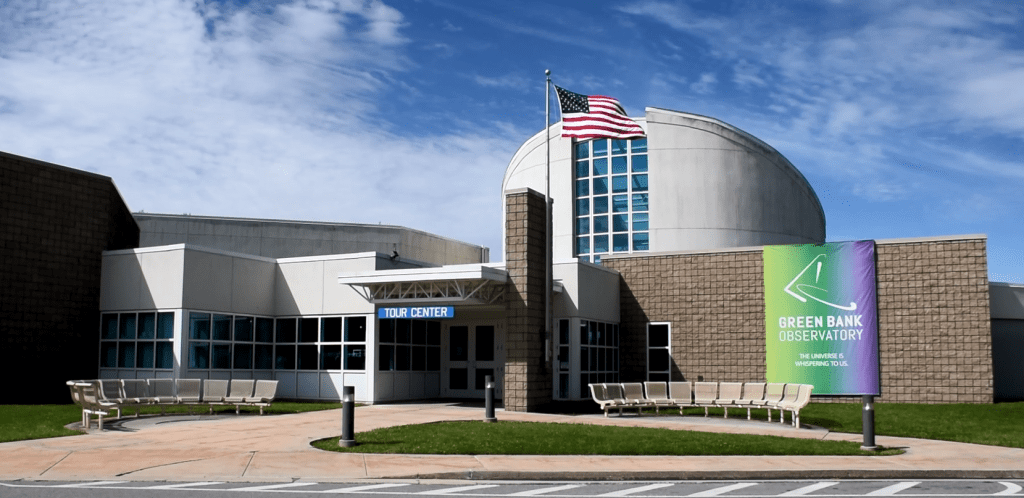This Town Prohibits WiFi for Sake of Tapping Extraterrestrials
Listen to “e165 This Town Prohibits WiFi for Sake of Tapping Extraterrestrials” on Spreaker.
October 30, 2019 (sputniknews.com)
• Since 1958, Green Bank, West Virginia has been home to the United States’ first national astronomy hub, the Green Bank Observatory. The world’s largest steerable radio telescope, the Robert C. Byrd Green Bank Telescope, has located black holes, gravitational waves, and pulsars to name a few cosmic anomalies. In September, GBT researchers detected the most massive neutron star ever captured by telescopic lenses.
• Green Bank is also where the ‘Search for Extraterrestrial Intelligence” (or “SETI”) began in 1960 with Project Ozma, a state-funded effort to listen for signals from potential extraterrestrial intelligences. SETI’s work is still ongoing at Green Bank.
• The 8,500 residents living in surrounding Pocahontas County are prevented by law from emitting any radio frequency interference (or RFIs) by their home electronic devices and appliances, to avoid data interference with Green Bank’s astronomical studies. Anti-RFI legislation dates back to a 1956 Act that says it’s “illegal to operate or cause to be operated any electrical equipment within a two-mile radius of… any radio astronomy facility”.
• Frequencies emitted by astronomical phenomena are simil



 ar to ordinary WiFi connections at 2.4 GHz. Staff at the observatory are charged with pinpointing local RFI hotspots that could potentially harm its research. RFI technician Chuck Niday drives around the county looking for unauthorized radio waves. In today’s era of high-tech gadgets and smart homes, unauthorized RFIs are becoming ubiquitous. Popular Mechanics quoted Niday as saying “We got tons of WiFi around here. It’s kind of don’t ask, don’t tell”. Niday notes that there is little that could be done about it – apart from the locations being properly mapped for further study, as observatory staffers don’t have the power to strip residents of their WiFi spots.
ar to ordinary WiFi connections at 2.4 GHz. Staff at the observatory are charged with pinpointing local RFI hotspots that could potentially harm its research. RFI technician Chuck Niday drives around the county looking for unauthorized radio waves. In today’s era of high-tech gadgets and smart homes, unauthorized RFIs are becoming ubiquitous. Popular Mechanics quoted Niday as saying “We got tons of WiFi around here. It’s kind of don’t ask, don’t tell”. Niday notes that there is little that could be done about it – apart from the locations being properly mapped for further study, as observatory staffers don’t have the power to strip residents of their WiFi spots.
• Green Bank’s site director Dr Karen O’Neil says, “The GBT is the most sensitive telescope in the world”. O’Neil admits that it is challenging to keep track of new RFI-causing WiFi connections. But being such a rural area, RFI interference is not nearly as ubiquitous as in other more densely populated areas. Says O’Neil, “If we ever lose the GBT, we will lose ability to dig deep into the universe.”
Green Bank, West Virginia is a key location for past and present-day cosmic research, as it’s been home to the iconic Green Bank Observatory ever since it first

opened in 1958 as the United States’ first national astronomy hub.

Here, operational telescopes, including the world’s largest steerable radio telescope, the Robert C. Byrd Green Bank Telescope, or GBT, have found black holes, gravitational waves, pulsars, and whatnot. Also, it is where just last month, local researchers detected the most massive neutron star ever captured by telescopic lenses.
And it doesn’t stop here: Green Bank is also where the comprehensive study and search for extraterrestrial intelligence (SETI) kicked off. In 1960, Frank Drake started Project Ozma here, the first US state-funded effort to listen for extraterrestrial intelligence and intercept signals, if there are any. Besides, the town is the place where he wrote his famed equation about the possibility of worlds other than ours.

SETI work is still ongoing at Green Bank, with a gigantic trove of one million gigabytes of related data filed over the last three years having been released to the public.
However, there is a nuance, if not a setback that comes with the continuous scientific progress in the area.
This part of the larger Pocahontas County, with a population of only 8,500 people, has long lived under binding anti-radio frequency interference (RFI) legislation, which forbids any devices or appliances at home or beyond that would emit RFIs – as these may ruin research, experts claim.
One of the past legislative acts that still applies there is the Virginia’s Radio Astronomy Zoning Act of 1956 that says it’s “illegal to operate or cause to be operated any electrical equipment within a two-mile radius of… any radio astronomy facility”.
FAIR USE NOTICE: This page contains copyrighted material the use of which has not been specifically authorized by the copyright owner. ExoNews.org distributes this material for the purpose of news reporting, educational research, comment and criticism, constituting Fair Use under 17 U.S.C § 107. Please contact the Editor at ExoNews with any copyright issue.
